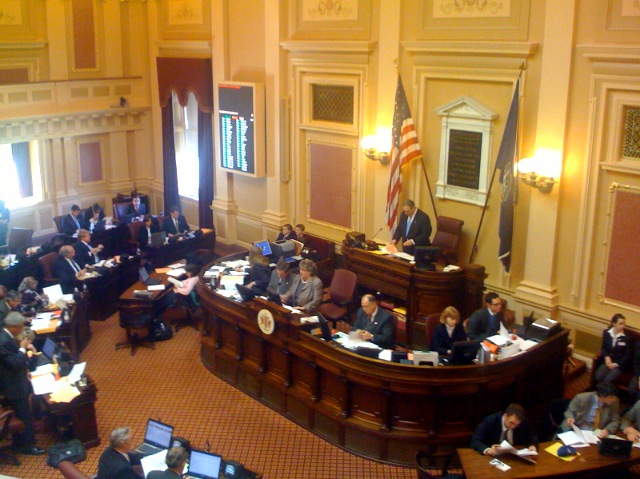Tuesday, Jan. 22, the Virginia House of Delegates blocked legislation that would make Virginia the 38th state to ratify the Equal Rights Amendment. This decision came just a week after the state Senate passed a resolution in favor of ratification.
In the Republican-controlled House, the Privileges and Elections Subcommittee voted along party lines to kill the resolution. An attempt to get the bill before the full committee was also voted down along party lines. As of now, the ERA, a proposed constitutional amendment to ban discrimination based on sex, appears to be dead in Virginia for the remainder of 2019.
Recently, the movement to ratify the ERA has gained steam, especially in Virginia, as feminist organizations and activist groups hope to codify gender equality in the Constitution. During the 2019 Williamsburg Women’s March, activists and legislators came together to advocate for the ERA. However, opposition to the ERA has also grown. Some critics argue that the ERA would make it impossible to separate the sexes into separate locker rooms or bathrooms, that abortion rights would become enshrined in the Constitution, and that the ERA is simply unnecessary.
Virginia House Delegate and Chair of the Privileges and Elections Subcommittee Margaret Ransone voted against ratifying the ERA in Virginia. Ransone said that opposing the ERA and supporting women’s equality are not incompatible, and that her vote against ratification should not be interpreted as a criticism of women’s rights.
“This morning I voted against the ERA because I think it’s simply not needed,” Ransone said in a House session Tuesday. “As a strong, independent woman, it was my choice to vote against the ERA. Don’t misunderstand what I’m saying, women deserve equal treatment, women deserve to be paid fairly, women deserve to have every opportunity in life, just like a man does. And thanks to the 14th Amendment and the Virginia Constitution, violating any one of those is against the law.”
However, others argue that the ERA is an important step in advancing American history. Williamsburg JCC Indivisible Co-Founder Heather Meaney-Allen, who supported the amendment’s passage in the Virginia legislature, likened the ERA’s potential ratification to the establishment of women’s suffrage through the passage of a constitutional amendment in 1920.
“I would say that it’s not unnecessary, because if the 14th Amendment, which is what they love to cite, gave us all the rights we need, the 19th Amendment wouldn’t have been necessary,” Meaney-Allen said. “We needed an amendment to give us the right to vote.”
In the Senate, the proposal to ratify the ERA enjoyed bipartisan support, with seven Republicans and 19 Democrats voting in favor of ratification. However, the bill was blocked by the Republican majority in the House Privileges and Elections Subcommittee. Historically, although Virginia has attempted to ratify the ERA five separate times, the proposal always died in the Republican-controlled House of Delegates, with mainly Republicans voting against the proposal.
“I think it’s silly, November is coming, and the Republicans, if they want to maintain control, they’re certainly doing something that’s not going to help them,” Meaney-Allen said. “People are angry, 81 percent of Virginians believe in this. And it’s not just for Virginia, if we ratify this, it affects the entire country. It’s a big deal.”
Meaney-Allen is referencing a recent poll from the Wason Center for Public Policy at Christopher Newport University, where Virginians were asked their opinions on multiple different issues.
Eighty-one percent of Virginians said they supported ratifying the ERA in the 2019 session.
According to VOX: Planned Parenthood Generation Action Co-President Emma Silverman ’19, the ERA embodies a practical way to acknowledge women’s rights.
“Besides fully accepting rights on the basis of sex, the ratification of the ERA would be an acknowledgement that rights previously founded under the Constitution were specifically established for men,” Silverman said. “I don’t think the ERA should be a partisan issue. Rather, it’s a fight for all people to establish their constitutional rights.”
For others, the opposition to the ERA represents a fight against women’s rights. College of William and Mary Young Democrats member Brooke Miller ’20 said that she feels as if that resistance toward ratification is rooted in systemic sexism.
“I think for me the ERA means a lot in terms of its historical significance and of course its contemporary cultural impacts,” Miller said in an email. “The fact that it was proposed in 1923, set to pass in 1982, and still hasn’t been ratified points to the slow progression of women’s rights in this country and the resistance against them.”
The ERA has a long history, but it is close to the finish line. Thirty-seven states have ratified the ERA, leaving just one more before the ERA can become part of the U.S. Constitution.
However, the ERA still faces a legal battle, as it was not ratified within the timeframe specified in the original bill.
For pro-ERA activists in Virginia, Tuesday’s decision marked yet another turn in the twisted road toward codifying gender equality.
“I was really disappointed to learn the outcome last week,” Miller said. “Given everything that has happened with the #MeToo movement and the Year of the Woman with these recent midterms, I think I was expecting to see some progress on it. But unfortunately, we didn’t see that progress.”

